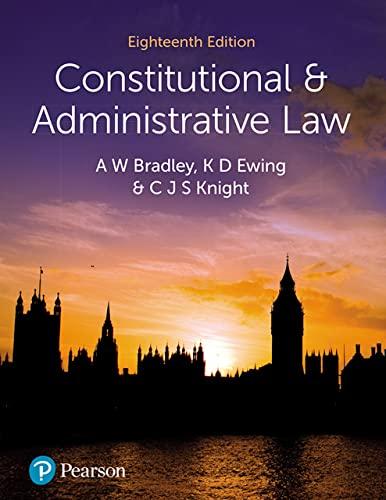Question
help me find and understand which statement is true, the topic is about mcculloch v. maryland (1819) This case led to the concept of implied
help me find and understand which statement is true, the topic is about mcculloch v. maryland (1819) This case led to the concept of "implied powers" and ultimately increased the powers of Congress despite the previously understood limitations to their power. Do you think that the Supreme Court got this case right? Do you agree with Chief Justice John Marshall's decision or did he get it wrong? Why or why not?
A. When it comes to the case of McColloch V. Maryland (1819) I feel that Chief Justice John Marshall made the wrong ruling. I feel this because of the implied power that he used to make his decision. I feel that the powers of congress are very direct and no where does it say that congress can create a bank. I feel that if Congress wanted to create a banking system (which I feel is a great idea), then they should have had to amend this and get the right permission for it. I do not feel that Congress had the implied power to create a bank and I feel that the court ruling in favor of McCulloch really opened up the doors to essentially let Congress do what they want. Once Congress was able to get away with this and create a federal bank, then it just made them stronger and gave them more power so to speak. The purpose of our constitution is to limit power, not give unlimited power, which essentially is what was done here.
B. I agree with the decision of Chief Justice John Marshall. According to the Chief Justice the Federal Government had the right and power to set up a Federal bank and that states did not have the power to tax the Federal Government. Marshall ruled in favor of the Federal Government and concluded, "the power to tax involves the power to destroy." As the power to tax is a very important issue, the act of the state of exercising the power to tax to Federal Government would mean that the states also had the power to destroy the federal government.
The states and the Federal Government must work hand in hand for the proper implementation of the law thus, one should not tax the other to preserve their authority and sovereignty.
Step by Step Solution
There are 3 Steps involved in it
Step: 1

Get Instant Access to Expert-Tailored Solutions
See step-by-step solutions with expert insights and AI powered tools for academic success
Step: 2

Step: 3

Ace Your Homework with AI
Get the answers you need in no time with our AI-driven, step-by-step assistance
Get Started


